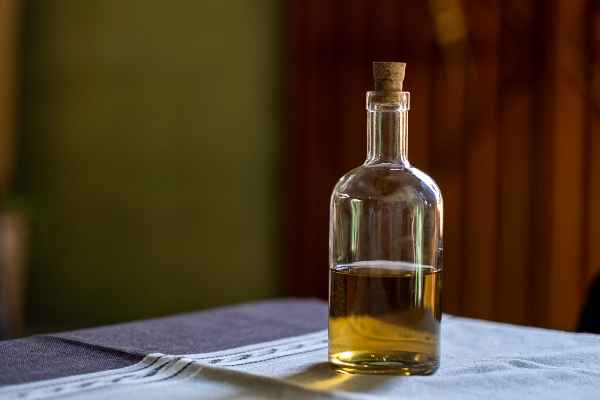Is Spirit Vinegar Halal?
We’ll explore the production process, delve into Islamic perspectives, and provide information on halal certification and alternatives for those seeking halal vinegar options.
Spirit vinegar is a particular kind of vinegar produced by fermentation of alcohol, which is usually generated from cereals like barley or maize.
It is a typical component in many foods, such as marinades, dressings, pickles, and sauces. Many Muslims across the globe have argued about whether or not spirit vinegar is permissible to consume.
This post will examine Is Spirit Vinegar Halal in the UK.
Table of Contents
What is Spirit Vinegar?
Spirit vinegar is a kind of vinegar produced by fermenting spirits. Grain, fruit, and vegetable products are just a few examples of the many sources from which the alcohol used in the fermentation process may be derived.
Spirit vinegar often contains alcohol obtained from cereals like barley or maize. Acetobacter, a particular kind of bacterium, is added to the alcohol to begin the fermentation process.
The vinegar’s primary ingredient, acetic acid, is created when the Acetobacter transforms the alcohol.
By a procedure known as distillation, which involves heating the acetic acid to a high temperature and then collecting the vapours that are created, the finished product is filtered to eliminate any impurities present.
The result of the process is spirit vinegar, which is created by condensing the vapours back into a liquid state.

How is Spirit Vinegar Made?
The production of spirit vinegar requires two separate steps. In the first stage, the alcohol is subjected to fermentation. In most cases, this is accomplished by introducing a kind of bacteria known as Acetobacter into the alcohol. Vinegar is mostly composed of acetic acid, which is produced when alcohol is fermented by the bacterium known as Acetobacter.
The acetic acid must go through a process of purification to rid it of any contaminants that may still be present in this phase. The conventional method for doing this is known as distillation.
It entails first subjecting the acetic acid to a high temperature and then collecting the vapours created due to the heating process. After this step, the vapours are returned to a liquid state, the ultimate result of the spirit vinegar production process.
The Halal Concern

The Significance of Halal
Halal, which means “permissible” in Arabic, plays a significant role in the lives of Muslims. It extends beyond dietary restrictions to encompass various aspects of life, including food and drink.
Common Misconceptions
Before diving into the specifics of spirit vinegar, it’s essential to address common misconceptions about halal food and beverages.
Is Spirit Vinegar Halal?
There has been much discussion among Muslims all over the globe over the halal status of spirit vinegar and whether or not it is permissible to consume. The most important question is whether or not the alcohol that is produced during the fermentation process is halal.
Alcohol is deemed haram (prohibited) in Islamic law because it can make people drunk. Nevertheless, some kinds of alcohol are regarded as halal (permissible), such as those used for therapeutic reasons or in industrial processes where they are entirely converted and not ingested. Such kinds of alcohol fall under the category of halal alcohol.
The alcohol utilized in the fermentation process to produce spirit vinegar is converted into acetic acid, which does not produce any intoxication effects or negative effects on the body. As a consequence of this, the vast majority of academics are in agreement that spirit vinegar is halal and that Muslims are permitted to eat it.
Nonetheless, some academics contend that spirit vinegar is not halal since there is a potential that the finished product would include a small quantity of alcohol even after it has been distilled. Even a trace quantity of alcohol, in the opinion of these religious authorities, violates Islamic law and should be avoided at all costs.
It is important to be aware that the legal limit for the amount of alcohol present in vinegar is set at less than 0.5% by volume in several nations worldwide, including the United States and Europe. This is done to confirm that vinegar is safe for human consumption and has no negative effects on the body.
Halal Vinegar Alternatives
For those looking for alternatives to spirit vinegar, we’ll present various halal vinegar options that you can incorporate into your cooking
Is White Wine Vinegar Halal?
White wine is fermented to produce a specific form of vinegar called white wine vinegar. Since the fermenting process uses alcohol made from grapes, it raises questions for Muslims who adhere to halal dietary regulations.
Due to its intoxicating effects, alcohol is regarded as haram (forbidden) under Islamic law. Nevertheless, certain forms of alcohol, such as those used for therapeutic or industrial operations that are entirely changed and not ingested, are considered halal (permissible).
Acetic acid, which is neither intoxicating nor damaging to the body, is changed from the alcohol used in the fermentation process of white wine vinegar. Because of this, most academics agree that Muslims may eat white wine vinegar since it is halal.
It is important to note that some academics contend that white wine vinegar is not halal since there may be traces of alcohol left in the finished product. Some scholars believe that even modest alcohol is forbidden and should be avoided.
According to their understanding of Islamic law, each Muslim must ultimately determine whether they feel free to consume white wine vinegar. A person should seek advice from a reputable Islamic scholar or authority if it is unclear whether white wine vinegar is halal.
FAQ-
Is spirit vinegar natural?
Yes, it is natural. Whether it’s called white refined vinegar, spirit vinegar or household vinegar, white vinegar is made mechanically from the alcoholic ageing and acetification of beetroot or maize. It is colourless, non-poisonous and can be utilised rather than any cleanser or degreaser.
What type of vinegar is halal?
The kind of vinegar that is regarded as halal is the one that is created from haram (forbidden) materials and does not include any of them. Most academics agree that both white wine vinegar and spirit vinegar are halal.
Is spirit vinegar in mayonnaise halal?
Yes, As the alcohol used in manufacturing is entirely converted into acetic acid, spirit vinegar in mayonnaise is often regarded as halal. If there are any questions or worries, it is always advised to examine the ingredients list and speak with a respected Islamic expert.
Is spirit vinegar the same as vinegar?
Much like other varieties of vinegar, spirit vinegar is a type of vinegar formed from the fermentation of alcohol. Although other forms of vinegar may be manufactured from other types of alcohol, such as wine or cider, this variety is solely generated from the fermentation of grain alcohol.
Conclusion
In conclusion, Muslims disagree about whether spirit and white wine are halal in the UK. Yet, according to most academic viewpoints, both kinds of vinegar are regarded as halal since they are produced by totally converting the alcohol used to make them into acetic acid, which is not intoxicating.
Nonetheless, if somebody has any questions or reservations regarding ingesting these goods, they should speak with a reputable Islamic scholar or authority. Ultimately, it is up to each Muslim to decide for themselves based on their understanding of Islamic law.














